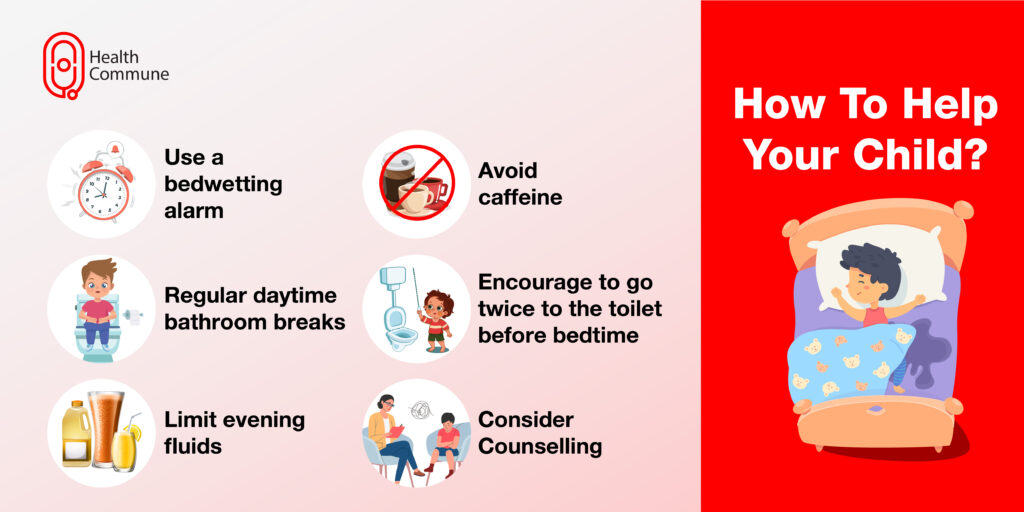Is your child wetting their bed at night? Don’t worry! Learn all about the causes, treatment, and prevention of bedwetting here.
What is bedwetting?
Bedwetting (also known as nocturnal enuresis or nighttime incontinence) is the involuntary or accidental passing of urine while asleep.
Is bedwetting normal?
Bedwetting isn’t a cause for concern until 7 years of age since your child is still developing brain-bladder control. However, if they continue to wet the bed beyond this period, it’s advisable to consult a doctor.
What are the causes of bedwetting?
This condition happens as a result of multiple factors:
- Family history: If you, your partner, or your relatives have a positive childhood history, the odds of your child having the same problem drastically increase as well
- Inability to recognize a full bladder: Your child’s brain-bladder control may not have fully developed yet so instead of waking up to use the bathroom, their bladder empties during sleep, leading to the involuntary passing of urine
- Small bladder: Your child’s bladder may be able to hold only a small quantity of urine
- Urinary tract infections: Your child may be suffering from an infection that can make it difficult to control their bladder
- Chronic constipation: If your child is constipated, the extra stool inside the rectum can put pressure on the bladder or interfere with the nerve signals that are sent to the brain
- Structural abnormalities in the urinary tract or nervous system can rarely cause bedwetting, resulting from defects in either system
- Hormonal imbalances: In certain cases, reduced levels of ADH (antidiuretic hormone) can lead to excessive production of urine beyond your child’s bladder capacity
- Diabetes: If your child is usually dry at night but begins to wet, it may be a sign of diabetes
- Sleep apnoea: Bedwetting could be a sign of sleep apnoea. Your child may experience difficulty breathing due to enlarged tonsils or adenoids. This decrease in oxygen can lead to increased production of urine as well as increased bladder pressure
- Stress or anxiety: Stress at school, home, or with friends can also act as triggers

What are the types of bedwetting?
There are mainly two types of bedwetting which includes:
- Primary enuresis: If your child has never been dry at night, it is called primary enuresis
- Secondary enuresis: If your child has started to wet the bed after being dry for six consecutive months, it is called secondary enuresis
How can bedwetting affect my child?
Your child may experience:
- Low self-esteem due to embarrassment or guilt
- Rashes in the bottom and genital area
- Loss of social opportunities such as sleepovers
Is bedwetting a lifelong condition?
Bedwetting most commonly affects children between 5 to 10 years of age. It progressively diminishes soon after and is quite rare in adulthood.
Do I need to take my child to a doctor for bedwetting?
This condition usually declines as your child gets older. Visit a doctor if they:
- Continue to wet the bed even after the age of 7.
- They have started to wet the bed again after a few months of being dry at night
- cloudy, pinkish or red-coloured urine
- increased frequency of urination
- greater urgency to pass urine
- burning while urinating
- wetting during the day
- snoring
- unusual increase in thirst
- any mood changes, withdrawals, or emotional outbursts
Is there a way to identify the cause of bedwetting with tests?
Your child’s doctor will ask you how often your child wets the bed and if there are any other symptoms. For more information, they can also do the following:
- Physical exam
- Urine testing (urinalysis and culture/sensitivity) to identify any kind of infection, to check for diabetes or any other health conditions
- Blood testing to check for diabetes, hormone problems, or other medical disorders
- Bladder scans and other radiological tests
What can I do to help my child with their bedwetting problem?
Most children usually outgrow this problem as they grow older. Stay patient and don’t punish your child. A few simple adjustments that you can make to reduce the chances of bedwetting that include:
- Reduce the amount of fluid your child drinks in the evenings
- Encourage them to empty their bladders twice before going to bed
- Encourage them to use the toilet regularly during the daytime or create a schedule to regulate their habits
- Avoid giving them food or beverages containing caffeine
- Use a bedwetting (enuresis) alarm that vibrates or makes a sound when your child starts to wet the bed. It wakes them up so that they can finish urinating in the bathroom. Over time, this allows them to recognise a full bladder and trains them to wake up and use the toilet
- Counselling can be helpful in case your child is suffering from some sort of stress or has experienced a traumatic event
Are there any medications for bedwetting?
If your child continues to wet the bed despite all the above measures, their doctor can recommend medications that either decrease the amount of urine produced at night or improve their bladder capacity.
- Desmopressin acetate (DDAVP): This is the man-made form of a naturally occurring hormone in our body called ADH (antidiuretic hormone).It functions by reducing the production of urine by the kidneys.
- Imipramine: This is an anti-depressant that has a relaxing effect on the bladder and allows it to hold urine
- Oxybutynin: This belongs to a group of drugs called anticholinergics and helps by preventing the bladder from contracting





